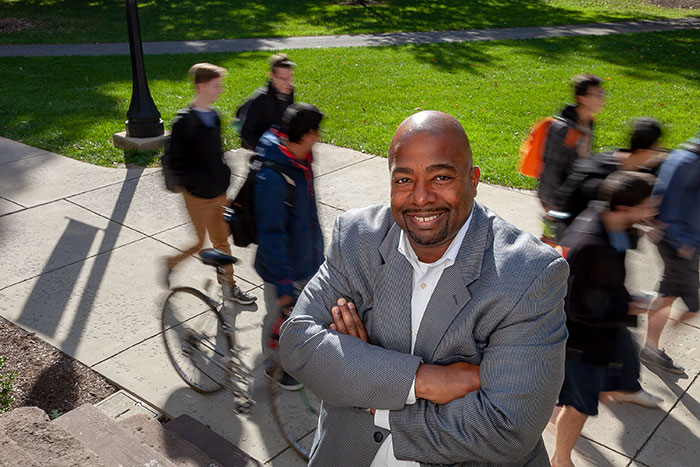10 Questions for George Stroud

Conversations regarding changes to campus structures and practices are ongoing. Any questions or suggestions can be directed to Vice President for Student Life George Stroud at stroudg@dickinson.edu.
George Stroud, Vice President for Student Life
by David Blosser '19
1. What excites you about working in the student life field, specifically at a liberal-arts college?
For the past 25 years, I have had the pleasure of working at various institutions in multiple capacities. What I continue to enjoy are the opportunities to make a meaningful impact on the lives of young adults. As educators, student life professionals help students to develop in areas such as leadership, conflict management, social responsibility and diversity/inclusion. Each of these are skills that aid the education of a well-rounded individual.
2. You have held several senior leadership positions in your career. What is your personal philosophy on leadership?
Effective leaders surround themselves with talent, identify the strengths of the team and strategically place team members in positions so that they can achieve success.
3. In 2017, the Department of Athletics was restructured into the Division of Student Life. What are your thoughts on this shift and how the two areas intersect?
It is my belief that a successful athletics program can have a tremendous impact on school pride. Athletics events provide the campus community with opportunities to become socially engaged while also helping to foster school spirit. Considering that student engagement is a primary goal for student life, it makes perfect sense for athletics to join the division.
4. You are currently working on an inclusivity initiative that inspires dialogue across the board. How do you plan to encourage respectful dialogue among those with diverging points of view?
Encouraging people to engage in civil dialogue regarding issues of difference can present some challenges. However, as an institution of higher education, we must be willing to remove barriers and provide the community with opportunities to discuss multiple perspectives on difficult issues. As our campus becomes more diverse, it is imperative that we strive to create a campus culture that acknowledges and celebrates the unique qualities of each individual while also respecting that there may be various points of view on any given topic.
5. How did you become interested in deep-sea fishing and what about it appeals to you?
My earliest memories of deep-sea fishing are from childhood summers spent on the Chesapeake Bay. What I have come to enjoy most about being on the water is that it provides me with a tremendous sense of peace.
6. What keeps you up at night?
The thought of failure.
7. So far, what has been your favorite place on campus? What about in Carlisle?
Definitely the front steps of Old West. During the interview process, I recall reading about the tradition associated with the steps and hoping that one day I could take part in the ceremonies. Thus far, my favorite place in Carlisle is Leo’s—I love the cornbread ice cream.
8. What are some of the recurring conversations that you find yourself having with students, and how are you addressing their concerns or priorities?
What has been impressive about Dickinson is just how welcoming and friendly everyone has been. I have connected with many students who have shown a sincere interest in getting to know more about me. I have found this to be quite refreshing. In terms of concerns, I have spoken with several students about the social life on campus. My staff and I are in the process of unpacking this issue to identify the specific needs of the campus.
9. Who do you consider as a role model in your life? Why do you look up to this person?
As a child, my grandfather served as a shining example for how I was to behave as a man. Through his words and actions, he taught me the value of hard work, humility and responsibility. Although he is no longer alive, I often find myself reflecting upon our past conversations when faced with difficult life decisions.
10. If you were not working in higher education, where do you think you would be right now? Why?
Teaching in a K-12 setting. I find great personal joy in helping young people realize their potential.
Read more from the winter 2019 issue of Dickinson Magazine.
TAKE THE NEXT STEPS
Published February 14, 2019